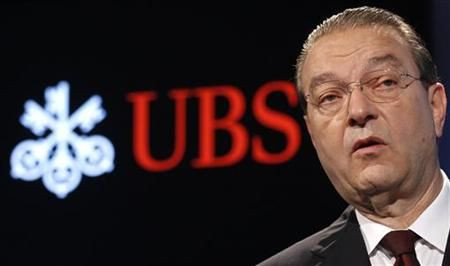UBS CEO Wilts Under Pressure to Resign
ANALYSIS

The resignation of the chief executive of Swiss banking giant UBS (NYSE: UBS) comes just days after Oswald J. Gruebel had brushed off calls for him to quit.
At that time, Gruebel said he would not quit and that he bore no personal responsibility for the illegal trade-related losses the bank incurred arising from activities buy a rogue employee in London.
"I am responsible for everything that happens in the bank. But if you ask me if I feel guilty, then I would say no," he told the Swiss newspaper Sonntag last Sunday.
He even suggested calls by Socialist Party officials for his resignation as being politically motivated.
That same day the Swiss tabloid Blick printed a headline declaring: "Herr Gruebel, time to say goodbye."
Even worse, the bank's honorary chairman Nikolaus Senn told Swiss- German television that he thought it would be best for Gruebel to quit.
"I don't know how many times Oswald Gruebel flew to London in order to understand from the managers on site what was going on," Senn said.
Still, Gruebel held his ground.
"I am not thinking about resigning," Gruebel told Sonntag.
Obviously, the pressure got to him and he made a sudden turnabout.
He had no other choice, given that the troubled Swiss institution was on the hook for a $2.3-billion loss arising unauthorized trades made by an employee named Kwaku Adoboli in London.
The actions of Adoboli could lead the bank to record a loss in the third quarter of this year, UBS said.
However, UBS chairman Kaspar Villiger had some warm parting words for Gruebel.
He said in a statement that Gruebel "feels that it is his duty to assume responsibility for the recent unauthorized trading incident. It is testimony to his uncompromising principles and integrity. During his tenure, he achieved an impressive turnaround and strengthened UBS fundamentally. He steps down having helped make UBS one of the world's best capitalized banks."
Gruebel was a legend in Swiss banking, having resuscitated not only UBS, but also its chief Swiss rival Credit Suisse Group AG (NYSE: CS). After a stellar career at Credit Suisse, Grubel came to the rescue of UBS when it racked up $50-billion in losses during the global credit crunch -- largely arising from its huge exposure to the U.S. subprime crisis.
Now that Grubel is gone, his permanent successor faces some monumental challenges.
UBS shares have plunged more than 36 percent year-to-date, while it tries to cope with a grimmer economic backdrop. The bank has already laid off thousands of workers to cut costs as revenues shrink.
Perhaps a graver issue the bank faces is the future of its investment banking unit. Some Swiss officials have even called for the elimination of investment banking business entirely.
Former justice minister Christoph Blocher told newspaper Sonntags-Zeitung: "We must seriously look at whether one should ban investment banking in commercial banks.”
© Copyright IBTimes 2025. All rights reserved.





















